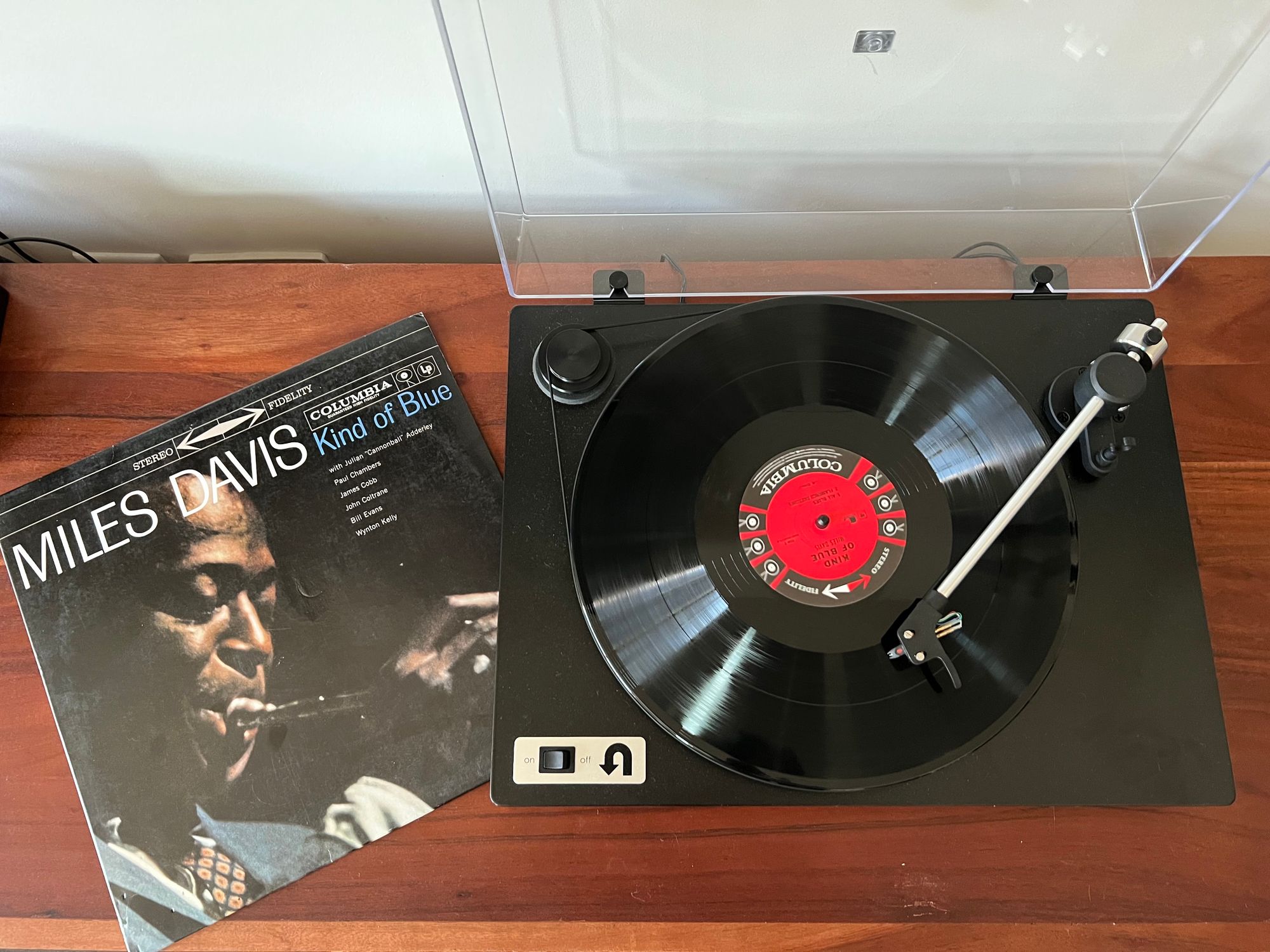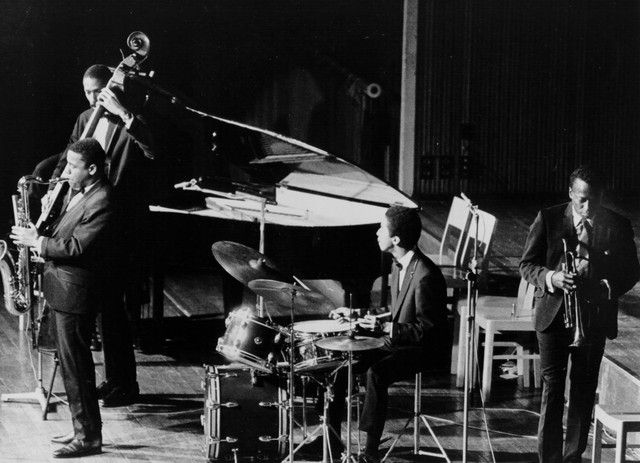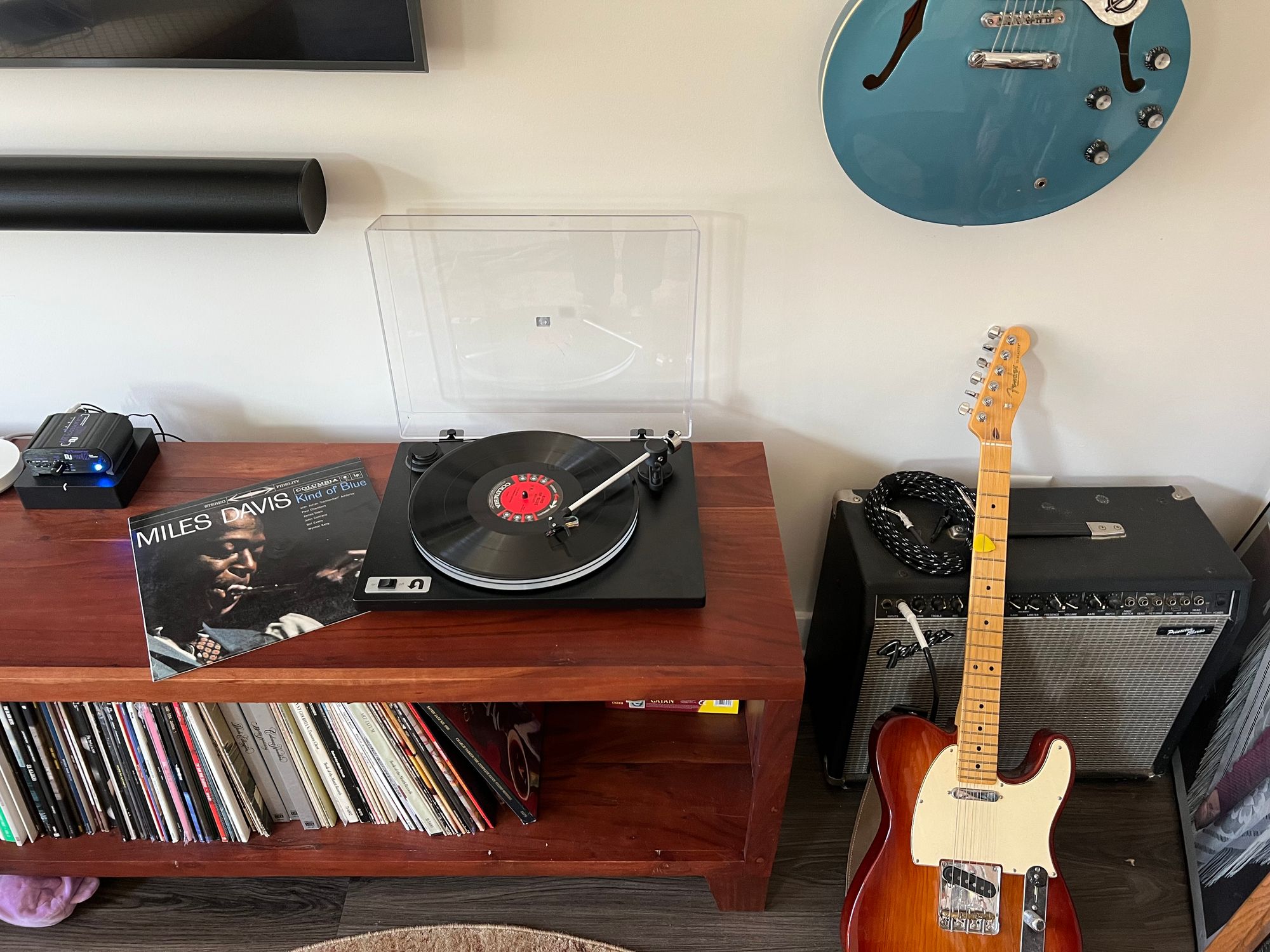OTR, Take 36: Miles Davis - Kind of Blue
Here's your link to today's album, which you definitely want to listen to: it will put you in a better mood.
What a glorious morning in Pittsburgh, PA. I love Pittsburgh – love it – but there's no denying that the weather is not always the best. Seattle might get the most rainy days in the continental US, but we get the most cloudy days. The whole city likely has a vitamin D deficiency. But the last three days? Chef's kiss perfect. 70 to 75 degrees, nice breeze, with cotton puff clouds lingering in the sky. It's been an early taste of fall, and I've said this many times: we might have less than ideal weather most of the year, but there's a two- to three-week stretch in late September through October where it's more beautiful here than anywhere in the world.
So last night Audra and I decided to do something a bit different. We live within walking distance of the local high school. That undersells it: we can hear with clarity the stadium loudspeaker and can walk to the stadium in 5 to 10 minutes, depending on how long we have to wait for the light at the front of our neighborhood. We've lived here for nearly three years and haven't gone to one of the high school football games. Shameful.
Now, high school football is a big deal in western Pennsylvania and our high school won the highest-level state championship last year (and has won three of the last six). It was such a perfect night – 70 degrees at kickoff with a field drenched in that highly saturated dying light of sunset.
Folks, if you ever want to feel old, go to a high school football game. I don't think of myself as old (I'm 42), but I sure as hell felt old last night! And I felt old in that very particular you'd think with all the money these kids' parents make, they could afford to clothe their children with a bit more fabric kind of way. This was the first time I've felt these thoughts rushing through my head. And when did feathered haircuts for guys come back into style? Hah.
Old man McGrann.
Still, it was great fun. I had such a lovely time getting out and doing something new and different with Audra. This new and different will be a bit of a theme for today's OTR. And we'll get to today's piece of perfection as soon as I can get these fucking kids off my lawn!

If you think you know Miles Davis, you probably know a version of Miles Davis. The precocious bebop trumpeter who mostly played with other people in the mid-40s; the fledgling bandleader who burst onto the scene with Birth of the Cool; the Miles who put together arguably the best quintet in the history of hard bop jazz...and then arguably the best quintet, with different members, in jazz history; the Miles who heard the coming of funk and gave it his own indelible stamp on records like Bitches Brew; the late-period Miles who finally let an electric bass play with the band.
How many creative lives is one man permitted to have? As the man himself once said:
Man, sometimes it takes a long time to sound like yourself.
I can't tell you how much I love that quotation. One misunderstanding I see a lot of young artists make, regardless of what artform, is this notion that we naturally have a unique voice that sounds only like ourselves. But it almost never works this way. (Perhaps we have to make space for the rare genius touched by god who does things we mere mortals can't fathom – but I don't really believe those people, or god, for that matter, exist.) All of us start our creative journeys by learning the standards – whether that means color theory and drawing circle after circle in the visual arts, putting on songs and learning to play along, following recipes from a great chef's cookbook, or writing in styles glommed from the writers who touch us.
It's only – only – when we've developed a foundation of competence that we can even consider the possibility of a unique voice. To put it slightly differently, it was only when I could ape my favorite writers that I could start writing as Owen McGrann, and only when I could play Beatles, Radiohead, and Stevie Ray songs that I could begin writing songs that sounded like me. We take on the learning and advances of our forebears and build from there.
Miles kept upping his own ante. He built on himself, and brought more and more astonishing musicians into his orbit to propel him further. Just take a look at some of the musicians who got their start or became known after Davis put them in his first and second quintets: Cannonball Adderly, John Coltrane, Bill Evans, Paul Chambers, Jimmy Cobb, Herbie Hancock, Wayne Shorter, Ron Carter, and Tony Williams.

This is the hard thing about writing about Miles: it's so obviously great it seems passe to even point it out; yet, good grief, he stops me dead in my tracks every time. He kept growing.
Next week, I'm headed out to do something I once swore I would never do: I'm going to a large conference. I'm by nature very introverted. I don't like crowds and tend to get swallowed up in them. I'll stand in a corner with a ginger ale and watch the party happen.
John Lindsey and I spoke about this in a yet-to-be-released episode of Sonder Union: introverts are quite capable of performing, getting on stage, playing a role (some of/most of the greatest performers you know and love are super introverted), but once off stage, it seems to others that we turn into a different person. Based on my writing, I find people expect me to be more bombastic or flamethrowing in real life than this mild-mannered quiet guy turns out to be. In real life, I'm pretty boring.
So going to a conference with 12,000+ people? This is definitely pushing me deep into discomfort – and that's something I've come to recognize as critical for my growth. Doing uncomfortable things, things that put me at risk for "failing." When I look back, the first time I got on stage, I was scared shitless; the first time I posted honestly on LinkedIn, it was harrowing; the first time I showed my writing to someone, it was as though I opened a deep wound for someone else to scrutinize. And it gets easier as you do it. Not coincidentally, you get better at it with repetition.

The single most impactful habit any of us can have is this: starting something uncomfortable, without the promise of it working. Or, as the motivational poster would have it, be brave enough to suck at something new.
So, if you're going to be at SaaStr next week, or know someone who is, hit me up. I'd love to meet you in person.
(An aside: I specifically chose a non-legal conference so that I would have to mingle with founders, salespeople, finance – the whole panoply of the startup world. I realized that these are my people as much or more than attorneys.)
It would have been easy for Miles to keep doing the thing that made his name, keep turning out numbers like those that made up Birth of the Cool or the great leap forward of Kind of Blue. Hell, nobody could have blamed him if he was content playing with Charlie Parker's quintet, where he first came to prominence. But some cats aren't wired like that. Some people need constant motion, endless evolution to feel like they're doing something that makes them feel alive.
If Miles rested on his laurels, can you imagine how big of a loss it would have been to not have my favorite bassline ever? To not have the mental breakdown acid trip of Bitches Brew? I dare you to listen to the first minute of "So What" and tell me that Paul Chamber's bassline doesn't both elevate your soul and slow your heartbeat at the same time.
I mean, it doesn't get any better than that (although, with all due respect to the dude in the video, Paul Chambers is in another universe entirely).
We've become so habituated to Kind of Blue – it's so pervasive in our cultural understanding of jazz – that it's easy to miss just how groundbreaking it was. The fact that the album was released within weeks of Ornette Coleman's The Shape of Jazz to Come (which I discussed in OTR, Take 7), another Great Leap Forward record is mindboggling. That short period in 1959 utterly reshaped our jazz vocabulary, in the same way that Einstein, Heisenberg, Szilard, etc. reshaped our physics vocabulary. Quantum physics is mainstream enough at this point we can make three-hour-long movies of men talking about nuclear physics and have them be blockbusters. The same thing has happened with jazz: what was once revolutionary and controversial is now pretty normal.
I was thinking about this when I first put on Kind of Blue this morning. This record jumped out of the album sleeve because I was looking for something calming, something that would level-set me for this upcoming week of travel and people.
I'm left now thinking about the double lesson I've talked myself into during the course of writing this OTR. We grow by exploring the unknown, learning the terrain, and then building something new on that terrain. The first step is to step outside of our everyday, out into the world of uncertain results. Then we become students, sopping up all we can learn about how people like us do things in these places, picking out certain practices and customs that appeal to us. And then – and only then – are we able to both coexist with the community and shape it, to introduce something new.
Isn't it always the case that in the process of trying to change the world, we find ourselves changed too?